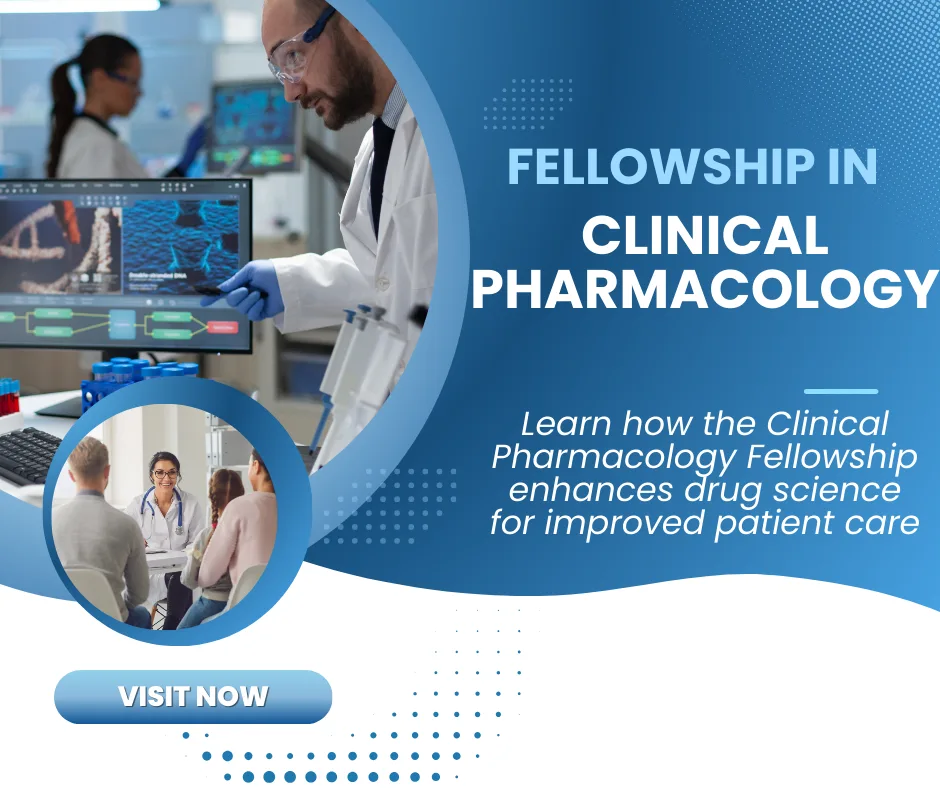
Clinical pharmacology is a vital and fundamental discipline within the modern healthcare system. It plays an essential role in understanding how drugs interact with the human body and optimising their use to effectively and safely treat various health conditions.
A Fellowship in Clinical Pharmacology provides extensive and focused education as well as training for healthcare professionals who are passionate about developing an in-depth comprehension of drug mechanisms, interactions, and their applications in therapy.
The fellowship program by MediCOLL Learning encompasses a range of essential topics, including pharmacokinetics, pharmacodynamics, drug metabolism, drug interactions, adverse drug reactions, and personalised medicine.
It also equips participants with the necessary skills to critically evaluate and apply evidence-based pharmacological principles in various settings, such as clinical practice, research, and pharmaceutical development.
The following serves as an informative guide outlining the comprehensive nature of a fellowship in clinical pharmacology. It highlights the significance of the fellowship for medical professionals aspiring to excel in various areas of healthcare and medical research.
Clinical pharmacology focuses on studying drugs and their application in clinical practice. It concentrates on understanding pharmacokinetics (how the body absorbs, distributes, metabolises, and excretes drugs) and pharmacodynamics (the effects of drugs on the body). This field bridges the gap between laboratory research and patient care by ensuring the safe and effective use of medications.
The importance of clinical pharmacology has grown exponentially with the advancement of new drug therapies, personalised medicine, the management of drug interactions and adverse reactions. Specialists in clinical pharmacology play a crucial role in promoting rational drug use, improving patient outcomes, and driving the development of new drugs and treatment regimes.
A fellowship in clinical pharmacology program aims to provide healthcare professionals with advanced knowledge and practical skills to enhance patient care, drug development, and regulatory science.
Key goals include:
The Clinical Pharmacology Fellowship program by MediCOLL Learning spans one year and includes both pedagogical learning and hands-on clinical training in a super-speciality hospital.
Core components of the curriculum may include:
A Fellowship in Clinical Pharmacology paves the way to a variety of career paths, including:
The healthcare landscape is continually evolving, with new therapies and complex drug regimens being developed every day.
A Fellowship in Clinical Pharmacology equips healthcare professionals with the expertise to navigate these development changes, making the individual a valuable asset in various settings such as hospitals, research institutes and regulatory authorities.
By mastering the science of drug action and application, the participant can have a significant impact on patient care, drug safety, and the future of medicine.
A Clinical Pharmacology Fellowship offers a comprehensive educational platform for healthcare professionals seeking to elevate their expertise in clinical practice, research, and the pharmaceutical industry.
This intensive fellowship program is designed to impart the healthcare professionals with the requisite knowledge and competencies to maximise patient care outcomes. In addition, priming the participants to navigate the ever-changing landscape of modern medicine.
As drug treatments become increasingly complex and the emphasis on personalised medicine grows, healthcare professionals specialising in clinical pharmacology will play a prime role in shaping the trajectory of healthcare.
© Copyrights Medicoll All rights reserved.